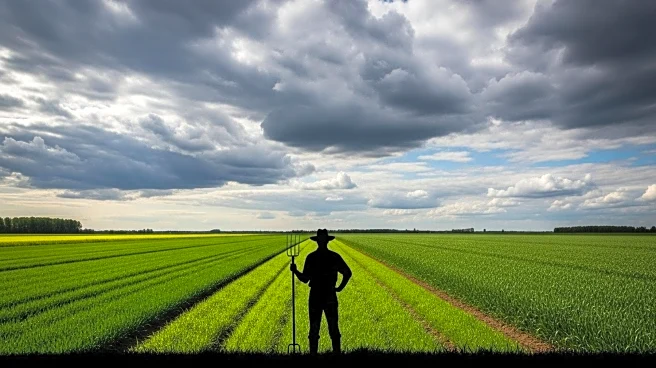What is the story about?
What's Happening?
The Pakistan Kissan Ittehad (KIP) has criticized Pakistani authorities for filing FIRs against farmers in Nasirabad, who were peacefully demonstrating for their rights. KIP Chairman Khalid Hussain Bathh, along with Arya Hoorain and Raza Muhammad Khilji, demanded the withdrawal of these cases and the immediate release of detained farmers. Bathh warned that failure to address these issues could lead to large-scale protests across several districts. He also urged the federal and provincial governments to declare wheat support prices before the sowing season to encourage cultivation and stabilize the agricultural sector. Additionally, Bathh called for a joint committee to assess the transition of agricultural tube wells to solar power, ensuring farmers' electricity connections remain intact during the review process.
Why It's Important?
The criticism from the KIP highlights significant challenges facing the agricultural sector in Balochistan, including water scarcity, erratic energy supply, and inadequate policies. The crackdown on farmers has exacerbated discontent among the agricultural community, which feels neglected by the state. The situation poses a threat to food security and economic stability in the region, as farmers struggle to maintain their livelihoods amid financial losses. The call for policy interventions underscores the need for government action to address these systemic issues and support the agricultural sector, which is vital for the region's economy and food supply.
What's Next?
If the authorities do not address the farmers' grievances, the KIP has indicated it will organize large-scale protests in various districts. This could lead to increased tension and unrest in the region, potentially impacting agricultural production and local economies. The government's response to these demands, including the declaration of wheat support prices and the assessment of solar power projects, will be crucial in determining the future stability of Balochistan's agricultural sector.
Beyond the Headlines
The ongoing issues in Balochistan's agriculture sector reflect broader challenges in Pakistan's rural areas, where farmers often face neglect and insufficient support from the government. The shift to solar power for tube wells, while potentially beneficial, requires careful implementation to avoid disrupting farmers' access to electricity. The situation also raises questions about the government's commitment to sustainable agricultural practices and energy solutions.
















